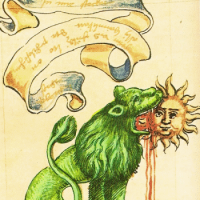Why have I never thought of this before??
从 orthohawk, 2015年6月27日
讯息: 14
语言: English
orthohawk (显示个人资料) 2015年6月27日下午2:57:21
Some years ago I was some minor distress at there being no gender neutral words for the siblings of one's parents or the children of one's siblings, so I borrowed a linguistic device i've seen used in other languages and came up with "parsib" (aunt/uncle) and "sibkid" (nephew/niece).
Anyway, I was going thru some old threads (looking for something not even related to this post) and came across the old argument about "gepatro" and such and came up with some new words:
ulgopo (Unu el La GePatroj)
ulgofo (Unu el la GeFratoj)
Ulgonko (Unu el La GeONKloj)
ulgono (Unu el La GeNevoj)
ulgopo (Unu el La GenePoj) and
ulgovo (Unu el La GeaVoj)
Waddaya think??
Fenris_kcf (显示个人资料) 2015年6月27日下午3:21:10
Breto (显示个人资料) 2015年6月27日下午4:05:53
orthohawk (显示个人资料) 2015年6月27日下午5:31:16
Breto:I think "ulgopo" might be more ambiguous than you intended. There can't be too many other languages that use the same word for both "parent" and "grandchild"....Oops!!! Didn't notice that one.....I'll have to rethink one of them

orthohawk (显示个人资料) 2015年6月27日下午5:32:11
Fenris_kcf:Though i assume your post is meant as cynical answer to endeavours of iĉistoj/hiistoj/riistoj/…, i chose the latter option; no offense.Oh, none taken. As I said, the entire post is somewhat facetious anyway.
nornen (显示个人资料) 2015年6月29日上午12:21:04
I am quite curious about this, because for instance English and Spanish terminologies differ a lot in this respect.
An English first cousin is in Spanish a primo hermano or primo carnal (both: cousin brother).
An English second cousin is in Spanish primo segundo (same thing).
An English n-th cousin (n > 1) is in Spanish also a primo n-o.
However:
An English first cousin once removed is in Spanish either a tío segundo (second uncle) or a sobrino segundo (second nephew).
An English first cousin twice removed is in Sapnish either a tío abuelo segundo (second grand-uncle) or a sobrino nieto segundo (second grand-nephew).
An English second cousin once removed is in Spanish either a tío tercero (third uncle) or a sobrino tercero (third nephew).
So what do you express this in Esperanto, as there is no "obvious" way (or various obvious ways) to name them?
orthohawk (显示个人资料) 2015年6月29日上午1:25:39
nornen:How do you say in Esperanto "n-th cousin m times removed"?Kuzido, kuzidido?
I am quite curious about this, because for instance English and Spanish terminologies differ a lot in this respect.
An English first cousin is in Spanish a primo hermano or primo carnal (both: cousin brother).
An English second cousin is in Spanish primo segundo (same thing).
An English n-th cousin (n > 1) is in Spanish also a primo n-o.
However:
An English first cousin once removed is in Spanish either a tío segundo (second uncle) or a sobrino segundo (second nephew).
An English first cousin twice removed is in Sapnish either a tío abuelo segundo (second grand-uncle) or a sobrino nieto segundo (second grand-nephew).
An English second cousin once removed is in Spanish either a tío tercero (third uncle) or a sobrino tercero (third nephew).
So what do you express this in Esperanto, as there is no "obvious" way (or various obvious ways) to name them?
or else go by the english model: unua kuzo, unufoje forigita. FWIW, many people in America haven't the slightest idea about the "n-th removed" system.
mbalicki (显示个人资料) 2015年6月29日上午1:27:38
nornen:How do you say in Esperanto "n-th cousin m times removed"?Well, I don't think one can. In Polish, for example “kuzyn”, “kuzynka” (kuzo, kuzino) is only a son or a daughter of one's aunt or uncle and I suppose the usage of the Esperanto noun kuzo is also limited to these relatives. I never came across the idea of “degrees” of cousins and “removing” in Esperanto.
If I were to use words describing further relatives I would start with praonklo, praonklino for the siblings of grandparents (and I see that there's such a word in “PIV”, which is nice), for the grandchildren of grandparents (children of cousins of parents, 2-nd cousins) I would use flankakuzo, flankakuzino and for the children of grandparents (cousins of parents, cousins once removed) I would use flankaonko, flankaonklino or praflankakuzo, praflankakuzino (or flankaprakuzo, flankaprakuzino).
But if you think that this “removing” thing is international enough, then why not to say m-foje pra n-a kuzo (or kuzino) or m-foje pra kuzo de la n-a grado in your general case of “n-th cousin m times removed”?
Breto (显示个人资料) 2015年6月29日上午1:56:33
For example (assuming males throughout for simplicity): Your father's first cousin is your first cousin once removed in English, and you are his first cousin once removed as well. However, in Esperanto, he is your duaranga onklo, and you are his duaranga nevo. Just like with cousins, the number increases the more generations you are removed from a common ancestor.
Edit: Parenceco ĉe Vikipedio
nornen (显示个人资料) 2015年6月29日上午2:02:58
@Breto
This sounds like the Spanish system. Thanks for your answers.


